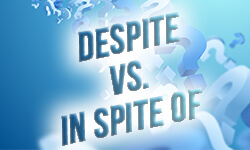
It’s common to encounter words that are easily confused. These are called commonly confused words. One such pair is “despite” and “in spite of.” Even though they may seem to have the same meaning and function, there are subtle differences in usage and style between the two. In academic writing, it is crucial to be clear and precise in effectively communicating your ideas; otherwise, the incorrect use of a word can negatively impact the quality of your writing.
Definition of “despite vs. in spite of”
“Despite” and “in spite of” are both phrases used in English to indicate a contrast or contradiction between two things. The word “despite” means regardless, while “in spite of” means regardless of the factors. They both function as prepositions and can be used interchangeably without changing the meaning of a sentence, however, there are slight differences in usage and style.
“In spite of” is considered more formal than “despite” and can be commonly seen in written English, especially in formal text. “Despite” is widely used in both spoken and written English.
Despite
In spite of
…is a prepositional phrase that is more commonly used in writing due to its formality. It also expresses a contrast between two things.
The key to differentiating between “despite” and “in spite of” lies in understanding the specific context and audience of your academic writing. If you are writing for a highly formal and traditional audience, “in spite of” might be more appropriate. However, for more general academic writing, “despite” is widely accepted and used. Ultimately, clarity and consistency in your usage are essential.
Using the word “despite”
The word “despite” is used as a preposition on its own and can also be used as a prepositional phrase in combination with “the fact that” in the English language. How it is applied in a sentence, and what the word means, will be explained below.
“Despite” as a preposition
The preposition “despite” can occupy the beginning or middle position of a phrase. Followed by a noun, it indicates that something happened or is true, even though there might have been obstacles or contrary expectations. “Despite” followed by a pronoun can indicate a contrast. Followed by a gerund (-ing form of a verb), it can indicate that an action or state occurred even though there were obstacles.
“Despite” as a prepositional phrase
“Despite” can be used with “the fact that” thus functioning as a prepositional phrase. The combination serves the same function in a sentence as “despite” standing alone, however, it is followed by a full clause (a group of words with a subject and a verb) and can make sentences longer and more complex. It also allows for more detailed and complete explanations of the contrast being presented.
Tip for using “despite” correctly
Synonyms for “despite” avoid repetition and redundancy and improve your language overall. Using them makes your writing more diverse and adds nuance to a language.
| Synonyms | Examples |
| Notwithstanding | Despite the traffic, he arrived on time. |
| Notwithstanding the traffic, he arrived on time. | |
| Although | Despite the rain, we had a great picnic. |
| Although it rained, we had a great picnic. | |
| Even though | Despite the cold, he wore shorts. |
| Even though it was cold, he wore shorts. |
Using the phrase “in spite of”
“In spite of” is a prepositional phrase used to show a contrast between two things. It is most often used in written English because of its formality. How it is applied in a sentence, will be illustrated below with the help of sample sentences as well as synonyms.
“In spite of” as a prepositional phrase
As a prepositional phrase, the phrase “in spite of” is used to convey a contrast or contradiction in a sentence. It is followed by a noun, a pronoun or a gerund. Here are three example sentences illustrating its use.
Tips for using “in spite of”
Including synonyms for “in spite of” can improve writing, prevent redundancy, and add nuance. Here are several alternatives with sample sentences.
| Synonyms | Examples |
| Nevertheless | In spite of all odds, the team managed to win the game. |
| Nevertheless, the team managed to win the game again all odds. | |
| Nonetheless | In spite of disagreeing on many issues, they remained close friends. |
| They disagreed on many issues, nonetheless, they remained close friends. | |
| However | In spite of the difficulty, he completed the task. |
| However difficult the task, he completed it. |
FAQs
Both show a contrast or a contradiction between two things, and can be used interchangeably.
Examples
- Despite the heavy rain, the outdoor wedding ceremony went ahead as planned.
- In spite of the heavy rain, the outdoor wedding ceremony went ahead as planned.
“Despite of” is not grammatically correct in Standard English. The correct phrase to use is “despite” or “in spite of.” They can be used interchangeably; however, “in spite of” is more common in written English due to its level of formality.
An example of how to use “despite” in a sentence is:
- Hanna’s company is doing extremely well despite the recession.
